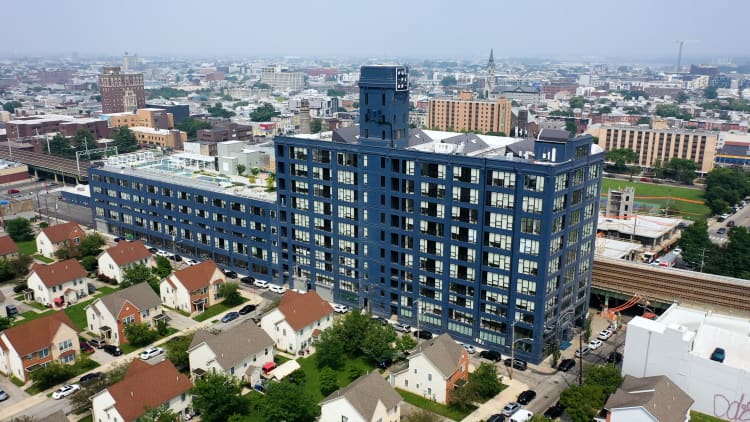An aerial photograph of houses and apartments on coastline in North Bondi, Sydney, Australia. Recent reports indicate that Australian home prices are set to continue their upward trend, driven by increasing migration rates and a shortage of housing supply.
Andrew Merry | Moment | Getty Images
Australia plans to address its climbing home prices in its national budget as the country struggles with a shortage of homes.
Despite the Reserve Bank of Australia’s aggressive monetary tightening efforts, home prices have steadily risen since bouncing back from a downturn in 2022. Recent figures by property consultant CoreLogic reveal that home prices rose for the 15th straight month in April. The median Australian home price now stands at 779,817 Australian dollars ($530,115).
Rents are also shooting up, rising 7.8% annually, according to Australian Bureau of Statistics data published last month. That’s the biggest jump since March 2009. It noted that rental price growth for flats has outpaced price growth for houses.
“Affordability is currently at the worst levels on record in Australia from a mortgage serviceability perspective,” said Eliza Owen, head of research at CoreLogic Australia. She also predicted that home values will continue to rise this year, though less than in 2023.
Treasurer Jim Chalmers is set to deliver the budget on Tuesday, which is expected to focus on addressing the nation’s housing crisis.
The Albanese government has already said it plans to allocate 88.8 million Australian dollars ($58.7 million) to train 20,000 local workers for the construction and housing sector. It also plans to spend AU$1.8 million on streamlining skill assessments for 1,900 potential migrants and prioritize 2,600 for targeted occupations.
Strained housing supply
The sharp rise in construction costs, labor and materials shortages have slowed the delivery of new builds, hampering the supply of new housing, according to a recent report by PropTrack.
“On the supply side, new housing had been constrained by ongoing capacity constraints – particularly for finishing trades and where the required skills were easily transferable to non-residential construction – and rapid increases in construction costs,” said the RBA during the recent March board meeting.
Developers and housing advocates have called on the Australian government to lift a ban on foreign skilled construction workers using a new fast track visa stream. Opposition leader Peter Dutton had criticized the Albanese administration, alleging it has shut doors to skilled tradespersons while failing to address migration issues.
“There’s an extraordinary mismatch in the supply and demand for housing in Australia at the moment. Most recently the contribution to that mismatch comes from record highs in net overseas migration amid a choke-hold on the residential construction sector from increased material cost and tight labor supply,” said Owen. “So you have a slower rate of completion in new dwellings amid an influx in arrivals who need housing.”
The country saw a net gain of 518,000 people in the year ending June 2023, which the ABS said was the largest gain since records began. About 75% of migrants arrived on temporary visas, more than half of which were international students, according to ABS.
The National Housing Supply and Affordability Council (NHSAC) said Australia’s limited housing supply has been further stretched by a number of factors, including “the resumption of migration at pace, rising interest rates, skills shortages, elevated construction company insolvencies, weak consumer confidence and cost inflation.”
“These all combine to create an environment in which prices and rents are growing faster than wages, rental vacancies are near all-time lows, 169,000 households are on public housing waiting lists, 122,000 people are experiencing homelessness and projected housing supply is very low,” it added.

The Albanese government established the NHSAC in December as part of its efforts to address the housing situation in Australia.
Last year, the government said it would begin building 1.2 million new “well-located” homes starting July 1 to tackle the housing crisis. Authorities also allocated AU$500 million to facilitate the development of new housing in “well-suited” locations.
Home ownership out of reach
Housing affordability is diminishing as home values and rental rates surge, outpacing the growth of household incomes.
While the average full-time annual income in Australia reached AU$98,098, according to the most recent figures from the Australian Bureau of Statistics, people who can buy a home make more than double that, at AU$220,000 on average. That marks a nearly 40% increase from AU$160,000 in 2019.
“The result is you get a falling rate of home ownership, more demand pressure on an already tight rental market, and then that cascades to the most vulnerable in our society, for example greater reliance on homelessness services,” said CoreLogic’s Owen.
She also said high housing prices have “ugly” long-term effects.
“We’re seeing real estate as a bigger driver of the wealth divide between wealthier and lower-wealth households, because income growth can’t keep up with prices,” Owen said. “Higher housing costs for renters and recent mortgage holders also weigh on our productivity and economic capacity because there’s less money left over for personal investment.”
The RBA said in its May monetary policy decision that “household consumption growth has been particularly weak as high inflation and the earlier rises in interest rates have affected real disposable income.” The central bank said households are saving and cutting back on discretionary spending.

— CNBC’s Christine Wang contributed to this report.

